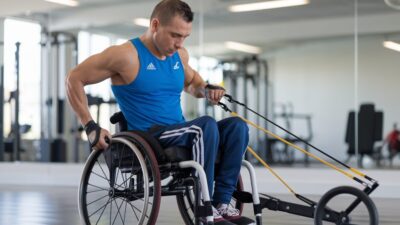Rest and recovery aren't just about taking a break – they're essential components of your fitness success. Your body needs this downtime to repair muscles, regulate hormones, and strengthen your immune system. When you're resting, you'll experience improved physical performance, sharper reaction times, and better coordination once you return to exercise. You'll also benefit mentally, as recovery time helps reduce anxiety, enhance focus, and boost motivation for future workouts. Proper nutrition, hydration, and activities like gentle walks or yoga can maximize your recovery benefits. The more you understand about recovery's role, the better you'll perform in your fitness journey.
Physical Benefits of Rest

The physical benefits of rest extend far beyond simply feeling refreshed. When you're sleeping or taking time to relax, your body is actually hard at work, performing essential maintenance and repair functions that keep you healthy and strong.
During these quiet hours, your muscles undergo vital muscle repair processes, rebuilding tiny tears that occur during exercise and daily activities. Additionally, incorporating an anti-inflammatory diet can further enhance recovery, reducing inflammation and improving overall health outcomes.
You'll notice improved physical performance when you give your body adequate rest. Your reaction times become sharper, your coordination gets better, and you'll have more stamina throughout the day. Your immune system also benefits greatly, as rest allows your body to produce and distribute immune cells more effectively, helping you fight off illnesses and infections.
Your heart and blood vessels take advantage of rest periods too. When you're resting, your blood pressure naturally drops, giving your cardiovascular system a much-needed break. This process helps prevent heart-related issues and reduces overall stress on your body.
You'll also experience better hormone regulation, which affects everything from your appetite to your energy levels throughout the day.
Mental Recovery After Exercise
Mental Recovery After Exercise
Physical recovery goes hand-in-hand with mental recovery after intense physical activity. When you exercise, you're not just putting stress on your muscles and joints, but you're also challenging your mind and nervous system. Taking proper rest days allows your brain to process the physical adaptations and mental growth you've experienced during workouts.
Incorporating mindfulness techniques, such as meditation, can enhance this recovery process by promoting present-moment awareness and reducing anxiety, which ultimately helps in mental rejuvenation embracing mindfulness.
During exercise, your brain releases various chemicals and hormones that affect your mood and cognitive function. After intense training sessions, you might feel mentally drained or foggy, which is why mental recovery is vital.
You'll notice that when you give yourself adequate downtime, you'll return to your next workout feeling mentally refreshed, focused, and motivated.
To support mental recovery, try incorporating activities like meditation, light stretching, or gentle walks on your rest days. These practices help reduce mental fatigue, decrease stress levels, and improve your overall mood.
Remember that pushing through mental exhaustion can lead to decreased performance, poor decision-making during workouts, and potential burnout. By prioritizing both physical and mental recovery, you're setting yourself up for long-term success in your fitness journey.
Signs You Need More Rest

Recognizing signs of inadequate rest can prevent overtraining and potential injuries. When your body isn't getting enough recovery time, it'll send you clear signals that shouldn't be ignored. In addition to physical fatigue, a lack of rest can lead to increased stress levels and anxiety, making it even more important to prioritize recovery.
Regular exercise can actually help reduce these feelings, providing the stress-relieving power of exercise as you balance your training with proper rest.
You'll notice your usual workouts feel much harder than normal, and you might struggle to complete exercises that were previously manageable. Your muscles may feel constantly sore, tight, or heavy, even after taking your regular rest days.
Watch for changes in your sleep patterns, too, as you might experience insomnia or feel exhausted even after a full night's rest.
Your mood can also indicate whether you need more rest. If you're feeling unusually irritable, unmotivated, or anxious about your workouts, it's time to step back.
Physical signs include an elevated resting heart rate, frequent headaches, and a weakened immune system that leaves you catching every cold that comes around. You might also notice decreased appetite, poor concentration at work or school, and delayed muscle recovery between training sessions.
When these signs appear, it's essential to adjust your recovery time and listen to your body's needs.
Rest Day Activities
Rest days don't mean you have to stay glued to your couch. Instead, you can engage in active recovery activities that help your body restore and rejuvenate while keeping you moving. Incorporating light activities on your rest days can enhance your overall fitness, as it promotes recovery and may even help you burn additional calories, boosting your metabolism in the process increasing calorie burn.
These lighter activities maintain blood flow and promote healing without putting extra stress on your muscles.
You'll find numerous ways to make the most of your rest days while staying moderately active. Try going for a gentle walk in your neighborhood, practicing basic yoga poses, or doing light stretching exercises to keep your muscles flexible.
Swimming at a relaxed pace, riding your bike around the park, or doing some casual gardening can also serve as perfect rest day activities.
If you're feeling social, consider inviting friends for a leisurely game of catch, joining a gentle tai chi class, or taking your dog for an extended walk.
Indoor activities like foam rolling, gentle mobility exercises, or basic balance training can help maintain your fitness while giving your body the break it needs.
Recovery Nutrition and Hydration

Fueling your body with proper nutrition and staying well-hydrated play essential roles in optimizing recovery after exercise. Your muscles need specific nutrients to repair themselves, and without proper hydration, your recovery process will slow down markedly.
After working out, you'll want to consume a combination of protein and carbohydrates within 30 minutes to jumpstart your body's recovery process. Incorporating smart nutrition strategies can enhance your recovery, allowing your body to utilize nutrients effectively and replenish energy stores for future workouts boost your cardio with smart nutrition.
When it comes to hydration, you shouldn't wait until you're thirsty to drink water. Instead, make it a habit to sip water throughout the day, especially before, during, and after exercise. A good rule of thumb is to drink half your body weight in ounces of water daily. For intense workouts, you'll need even more to replace what you've lost through sweat.
Proper nutrition and hydration also support quality sleep and recovery. You'll want to include foods rich in magnesium, like nuts and leafy greens, which help promote better sleep.
Additionally, timing your meals properly can make a difference – try to avoid heavy meals close to bedtime, as they might disrupt your sleep patterns and slow down recovery.



